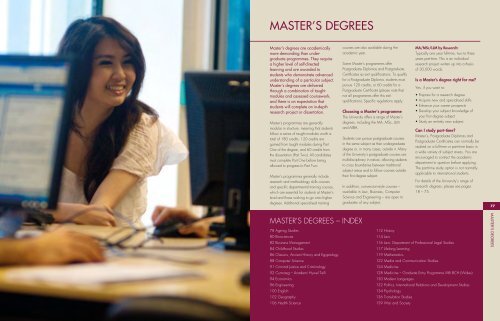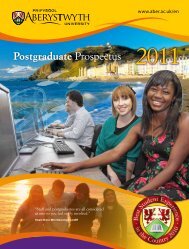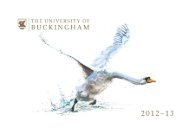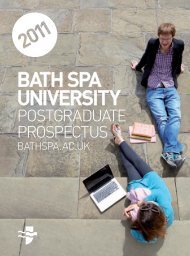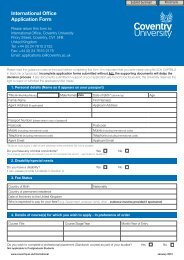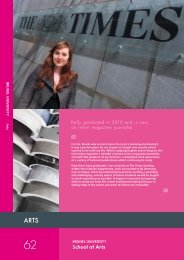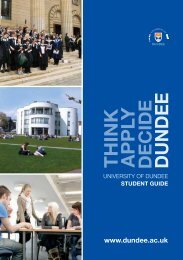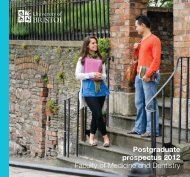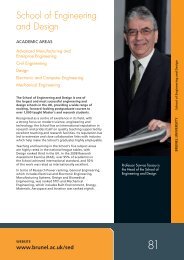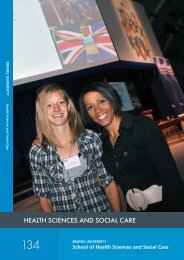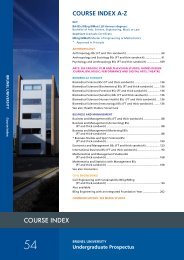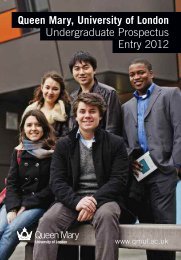MASTER’S DEGREESMaster’s degrees are <strong>ac</strong>ademicallymore demanding than undergraduateprogrammes. They requirea higher level of self-directedlearning and are awarded tostudents who demonstrate advancedunderstanding of a particular subject.Master’s degrees are deliveredthrough a combination of taughtmodules and assessed coursework,and there is an expectation thatstudents will complete an in-depthresearch project or dissertation.Master's programmes are generallymodular in structure, meaning that studentsfollow a series of taught modules worth atotal of 180 credits. 120 credits aregained from taught modules during PartOne of the degree, and 60 credits fromthe dissertation (Part Two). All candidatesmust complete Part One before beingallowed to progress to Part Two.Master’s programmes generally includeresearch and methodology skills coursesand specific departmental training courses,which are essential for students at Master’slevel and those wishing to go onto higherdegrees. Additional specialised trainingcourses are also available during the<strong>ac</strong>ademic year.Some Master’s programmes offer<strong>Postgraduate</strong> Diplomas and <strong>Postgraduate</strong>Certificates as exit qualifications. To qualifyfor a <strong>Postgraduate</strong> Diploma, students mustpursue 120 credits, or 60 credits for a<strong>Postgraduate</strong> Certificate (please note thatnot all programmes offer this exitqualification). Specific regulations apply.Choosing a Master's programmeThe University offers a range of Master’sdegrees, including the MA, MSc, LLMand MBA.Students can pursue postgraduate coursesin the same subject as their undergraduatedegree or, in many cases, outside it. Manyof the University’s postgraduate courses aremultidisciplinary in nature, allowing studentsto cross boundaries between traditionalsubject areas and to follow courses outsidetheir first degree subject.In addition, conversion-style courses –available in Law, Business, ComputerScience and Engineering – are open tograduates of any subject.MA/MSc/LLM by Research:Typically one year full-time, two to threeyears part-time. This is an individualresearch project written up into a thesisof 30,000 words.Is a Master’s degree right for me?Yes, if you want to:• Prepare for a research degree• Acquire new and specialised skills• Enhance your career prospects• Develop your subject knowledge ofyour first degree subject• Study an entirely new subject.Can I study part-time?Master’s, <strong>Postgraduate</strong> Diplomas and<strong>Postgraduate</strong> Certificates can normally bestudied on a full-time or part-time basis ina wide variety of subject areas. You areencouraged to cont<strong>ac</strong>t the <strong>ac</strong>ademicdepartment in question before applying.The part-time study option is not normallyapplicable to international students.For details of the University’s range ofresearch degrees, please see pages18 – 75.77MASTER'S DEGREES – INDEX78 Ageing Studies80 Biosciences82 Business Management84 Childhood Studies86 Classics, Ancient History and Egyptology88 Computer Science91 Criminal Justice and Criminology92 Cymraeg – Academi Hywel Teifi94 Economics96 Engineering100 English102 Geography106 Health Science112 History114 Law116 Law: Department of Professional Legal Studies117 Lifelong Learning119 Mathematics122 Media and Communication Studies124 Medicine128 Medicine – Graduate Entry Programme MB BCH (Wales)130 Modern Languages132 Politics, International Relations and Development Studies134 Psychology136 Translation Studies139 War and SocietyMASTER'S DEGREES
AGEING STUDIESPopulation ageing is an issue that will dominate thetwenty-first century. It is unprecedented and profoundand will have an enduring effect <strong>ac</strong>ross the globe.Changes in the population structure will touch allaspects of life, from family composition and livingarrangements, to social support, economic <strong>ac</strong>tivity, andsocial security, as well as the consumption of goodsand leisure <strong>ac</strong>tivity.This degree will:• equip you with the skills necessary for a rewarding careerworking with older people, and managing and deliveringservices for an older population• help you to gain transferable skills, including team working,communication, presentation, and analytical skills• prepare you for a research degree.MSc in Ageing StudiesThis programme <strong>ac</strong>knowledges that ageing is <strong>ac</strong>companied bybiological changes, but takes a holistic appro<strong>ac</strong>h to ageing. Itshifts the central focus from the medical model of ageing, to onethat encompasses a range of disciplines, viewing the process asa positive experience.The staff delivering the course have connections to policy makersthat are unparalleled in other parts of the UK. The course is alsoexceptional in its <strong>ac</strong>knowledgment of differences in policybetween the devolved countries of the UK, and in the globalcontext.Compulsory Modules• Population Ageing and Policy: An Introduction• Perspectives on Ageing• Foundations in Research• Health and Ageing.Optional Modules*• Policies and Pr<strong>ac</strong>tices for an Ageing Population• Critical Social Work with Older People• Environment and Ageing• Older People, Citizenship and Participation.How the degree is structuredThe programme is comprised of sixmodules and a dissertation. E<strong>ac</strong>h moduleprovides the opportunity to examinecutting-edge debates and issues onageing in an international context.The programme is offered on a full-time orpart-time basis. Full-time students attendlectures one day per week and willnormally complete six modules and submittheir dissertation by the end of the firstyear. Part-time students normally take twoyears to complete six modules, and afurther year to complete the dissertation.“The most enjoyable part of the coursewas having <strong>ac</strong>cess to such a wide variety ofspecialist speakers. Video conferencingf<strong>ac</strong>ilities enable students to discuss issues insuch pl<strong>ac</strong>es as Ireland and India. This globalperspective was fascinating and enabled amore critical view of more local issues.I would definitely recommend SwanseaUniversity to other students, particularly theMSc in Ageing Studies course. In f<strong>ac</strong>t, I havealready persuaded a colleague to enrol inthe course next year! Apart from thepr<strong>ac</strong>tical benefits, such as ample parkingf<strong>ac</strong>ilities, a well stocked library, numerouscoffee shops and the beautiful location,Swansea University is staffed with a varietyof expert and helpful people, committed tothe development of students.”Robert Workman,MSc Ageing Studies* We reserve the right to withdraw optional modules78MASTER'S DEGREES – AGEING STUDIESEntry requirementsApplicants holding, or expecting to <strong>ac</strong>hieve anHonours degree (2.2 or above) will be considered.Candidates with non-standard entry qualifications areencouraged to apply and may be admitted on thebasis of relevant work experience or professionalqualifications with requisite approval. Two yearsemployment experience in local authorities, health,private and voluntary organisations and industry willbe considered as relevant.English Language RequirementIELTS 6.5 (with a minimum of 5.5 in e<strong>ac</strong>h component)or Swansea University recognised equivalent.Scholarships and BursariesA range of postgraduate scholarships and bursariesis available. For details, please visit<strong>www</strong>.<strong>swansea</strong>.<strong>ac</strong>.<strong>uk</strong>/scholarships/<strong>Postgraduate</strong>AssessmentThe Master’s degree is available by assessed coursework and adissertation of around 20,000 words. The dissertation may bebased on a literature review or empirically grounded research.Further informationWebsite: <strong>www</strong>.<strong>swansea</strong>.<strong>ac</strong>.<strong>uk</strong>/humanandhealthsciences/postgraduate/taughtmastersCont<strong>ac</strong>t the Admissions Tutor:Dr. Sarah Hillcoat-Nallétamby,Centre for Innovative AgeingEmail: s.hillcoat-nalletamby@<strong>swansea</strong>.<strong>ac</strong>.<strong>uk</strong>Tel: + 44 (0)1792 295783Visit the University: see page 182 for detailsApplications can be made online at:<strong>www</strong>.<strong>swansea</strong>.<strong>ac</strong>.<strong>uk</strong>/applyonline– see pages 184 – 185 for further informationFor details of research degrees available inAgeing Studies, please see page 20.79MASTER'S DEGREES – AGEING STUDIES


